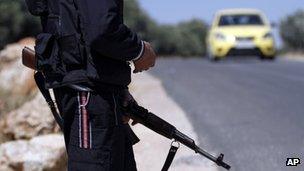Free Syrian Army rebels abandon Annan ceasefire
- Published

The Free Syrian Army says its attacks on soldiers aim to defend the Syrian people
The rebel Free Syrian Army is no longer committed to the nominal ceasefire in Syria, a spokesman has said.
Spokesman Sami al-Kurdi told Reuters news agency the FSA had begun attacking soldiers to "defend our people".
At least 80 Syrian soldiers were killed by rebels over the weekend, an activist group said.
The ceasefire is part of UN-Arab League envoy Kofi Annan's peace plan - very little of which has been actually implemented, observers say.
The FSA's announcement and a defiant speech by Syrian President Bashar al-Assad on Sunday have raised questions about the viability of Mr Annan's six-point plan.
On Monday French Foreign Minister Laurent Fabius said there had been "so many abuses" by the Syrian regime that no lasting solution was possible while Mr Assad remained in power.
But UN Secretary General Ban Ki-moon has reiterated that Mr Annan's plan "remains central" to resolving the Syrian crisis.
Thirty-one people were killed in Syria across Syria on Monday, largely by government forces, said the Local Co-ordination Committees, a network of anti-government groups.
Earlier the Syrian Observatory of Human Rights, a UK-based group, said at least 80 soldiers had been killed in clashes with Free Syrian Army fighters in Damascus and Idlib province.
New rebel group
Maj Kurdi told Reuters on Monday: "We have decided to end our commitment" to the ceasefire.
The announcement essentially formalises the existing situation whereby both sides have been conducting operations in recent weeks more or less as though the truce no longer existed, says the BBC's Jim Muir in Beirut, neighbouring Lebanon.
Meanwhile, the formation of a new opposition coalition - the Syrian Rebels Front - was announced at a news conference in Turkey.
Spokesman Khaled al-Okla said the new group represented 12,000 fighters, and that it had been formed in part as a response to Arab and international "failure" to "rein in Assad from his crimes".
The developments put pressure on Mr Annan and the international community to find a way to implement Mr Annan's plan - which has universal international support.
Mr Annan is to brief the UN Security Council on Thursday, and will go on to Washington for talks with the US administration.
Russia and China have repeatedly opposed UN-backed Western intervention in Syria - such as the no-fly or buffer zones proposed by some Syrian rebels - and observers say there is no international "Plan B" in Syria if the Annan plan fails.
The US want to try to persuade the Russians to use their leverage with Damascus, to bring about a radical change of direction by the regime, our correspondent says.
But he says there was no sign of that in President Assad's speech to parliament on Sunday. The Syrian leader he insisted Damascus was facing not an internal crisis but an external war, waged against it because of its support for resistance to Israel.
He has denied any government role in the massacre at Houla, in which 108 people were killed - many in house-to-house killings which witnesses said were carried out by pro-regime gunmen.